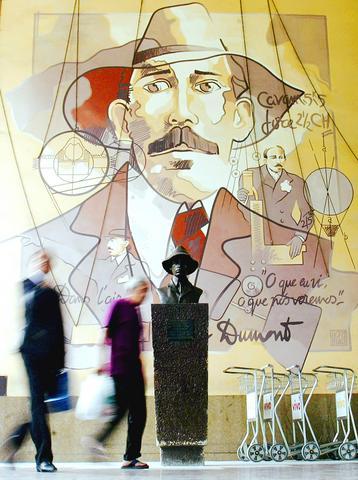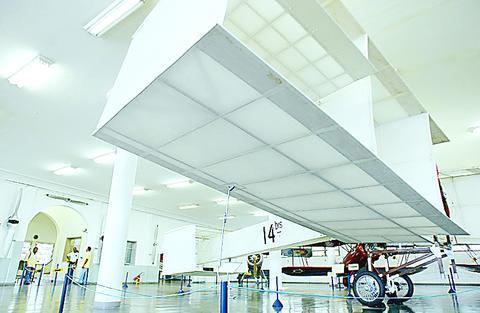As Americans prepare to celebrate the centennial of the Wright brothers' first flight, a whole country is cringing at what it believes to be a historical injustice against one of its most beloved heroes.
Ask anyone in Brazil who invented the airplane and they will say Alberto Santos-Dumont, a 160cm bon vivant who was as well known for his aerial prowess as he was for his dandyish dress and high-society life in Belle Epoque Paris.
As Paul Hoffman recounts in his Santos-Dumont biography Wings of Madness, the eccentric Brazilian was the first and only person to own a personal flying machine that could take him just about anywhere he wanted to go.

PHOTO: REUTERS
"He would keep his dirigible tied to a gas lamp post in front of his Paris apartment at the Champs-Elysees and every night he would fly to Maxim's for dinner. During the day he'd fly to go shopping, he'd fly to visit friends," Hoffman said.
An idealist who believed flight was spiritually soothing, Santos-Dumont financed his lavish lifestyle and aerial experiments in Paris with the inheritance his coffee-farming father had advanced him as a young man. Always impeccably dressed, he regularly took a gourmet lunch with him on his ballooning expeditions.
It was on Nov. 12, 1906, when Santos-Dumont flew a kite-like contraption with boxy wings called the 14-Bis some 220m in the outskirts of Paris. It being the first public flight in the world, he was hailed as the inventor of the airplane all over Europe.

PHOTO: REUTERS
It was only later that the secretive Orville and Wilbur Wright proved they had beaten Santos-Dumont at Kitty Hawk, North Carolina, three years earlier on Dec. 17.
But to bring up the Wright brothers with a Brazilian is bound to elicit an avalanche of arguments -- some more reasonable than others -- as to why their compatriot's flight didn't count.
"It's one of the biggest frauds in history," scoffs Wagner Diogo, a taxi driver in Rio de Janeiro, of the Wrights' inaugural flight. "No one saw it and they used a catapult to launch" the airplane.
DID IT COUNT?
Apparently, the debate comes down to how you define the first flight of an airplane.
Henrique Lins de Barros, a Brazilian physicist and Santos-Dumont expert, argues that the Wright brothers' flight did not fulfil the conditions that had been set up at the time to distinguish a true flight from a prolonged hop.
But Santos-Dumont's flight did meet the criteria, which in essence meant he took off unassisted, publicly flew a predetermined length in front of experts and then landed safely.
"If we understand what the criteria were at the end of the 19th century, the Wright brothers simply do not fill any of the prerequisites," says Lins de Barros.
Brazilians also claim that the Wrights launched their Flyer in 1903 with a catapult or at an incline, thereby disqualifying it from being a true airplane because it did not take off on its own.
Even Santos-Dumont experts like Lins de Barros concede this is wrong. But he says that the strong, steady winds at Kitty Hawk were crucial for the Flyer's take-off, disqualifying the flight because there was no proof it could lift off on its own.
Peter Jakab, chairman of the aeronautics division at the National Air and Space Museum in Washington and a Wright brothers expert, says such claims are preposterous.
By the time Santos-Dumont got around to his maiden flight the Wright brothers had already flown numerous times, including one in which they flew 39km in 40 minutes.
"Even in 1903 the airplane sustained itself in the air for nearly a minute. If it's not sustaining itself under its own power it's not going to stay up that long," Jakab says.
Even in France -- never a country too eager to agree with the US point of view -- the Wrights are considered to have flown before Santos-Dumont, says Claude Carlier, the director of the French Centre for the History of Aeronautics and Space.
"There's a strong nationalist issue at play here," says Marcos Villares, Santos-Dumont's great grandnephew. "Flight was a very important step in human history, in the history of technology. Every country wants to claim priority."
FATHER TIME?
But that is not to say that Santos-Dumont does not deserve recognition for his other contributions.
By rounding the Eiffel Tower in a motorized dirigible in 1901, he helped prove that air travel could be controlled and a practical means of transportation.
"Just to show that the flying machine was practical is an incredible achievement," says Hoffman, his biographer.
At his summer home in the Brazilian mountain town of Petropolis, tour guides perpetuate myths about Santos-Dumont -- such as how he invented the wristwatch.
Santos-Dumont experts deny that assertion, although they concede he was probably the first male civilian to use a watch after asking his friend Louis Cartier to make him a timepiece he could use while flying. Previously, only royalty and soldiers had used watches.
To this day, you can still buy the Santos-model Cartier watch for only a couple of thousand dollars.

Under pressure, President William Lai (賴清德) has enacted his first cabinet reshuffle. Whether it will be enough to staunch the bleeding remains to be seen. Cabinet members in the Executive Yuan almost always end up as sacrificial lambs, especially those appointed early in a president’s term. When presidents are under pressure, the cabinet is reshuffled. This is not unique to any party or president; this is the custom. This is the case in many democracies, especially parliamentary ones. In Taiwan, constitutionally the president presides over the heads of the five branches of government, each of which is confusingly translated as “president”

By 1971, heroin and opium use among US troops fighting in Vietnam had reached epidemic proportions, with 42 percent of American servicemen saying they’d tried opioids at least once and around 20 percent claiming some level of addiction, according to the US Department of Defense. Though heroin use by US troops has been little discussed in the context of Taiwan, these and other drugs — produced in part by rogue Chinese Nationalist Party (KMT) armies then in Thailand and Myanmar — also spread to US military bases on the island, where soldiers were often stoned or high. American military policeman

An attempt to promote friendship between Japan and countries in Africa has transformed into a xenophobic row about migration after inaccurate media reports suggested the scheme would lead to a “flood of immigrants.” The controversy erupted after the Japan International Cooperation Agency, or JICA, said this month it had designated four Japanese cities as “Africa hometowns” for partner countries in Africa: Mozambique, Nigeria, Ghana and Tanzania. The program, announced at the end of an international conference on African development in Yokohama, will involve personnel exchanges and events to foster closer ties between the four regional Japanese cities — Imabari, Kisarazu, Sanjo and

The Venice Film Festival kicked off with the world premiere of Paolo Sorrentino’s La Grazia Wednesday night on the Lido. The opening ceremony of the festival also saw Francis Ford Coppola presenting filmmaker Werner Herzog with a lifetime achievement prize. The 82nd edition of the glamorous international film festival is playing host to many Hollywood stars, including George Clooney, Julia Roberts and Dwayne Johnson, and famed auteurs, from Guillermo del Toro to Kathryn Bigelow, who all have films debuting over the next 10 days. The conflict in Gaza has also already been an everpresent topic both outside the festival’s walls, where